Post
A catch
Save a catch to start your fishing logbook. You will be able to to share it with the community if yo want!
A fishing trip
Post an ad to go fishing with other fishermen
Save a catch to start your fishing logbook. You will be able to to share it with the community if yo want!
Post an ad to go fishing with other fishermen
Share a thought, a question with the community
My favorite cities
×Join our 651 fishermen and our 2 cofishermen in Whilton in Northamptonshire. The fishing forecast is currently 2.9. The most caught fishes here are bleak fish, the silver bream, the ide fish and the chub fish. Come try the most famous fishing techniques like the tips on material to catch bass with jig, lure fishing for bass, tips on material for support fishing for sea bream or gathering seafood by hand.
Our fishing forecast of Whilton indicates the best time to go fishing in this city.
Bleak Fish
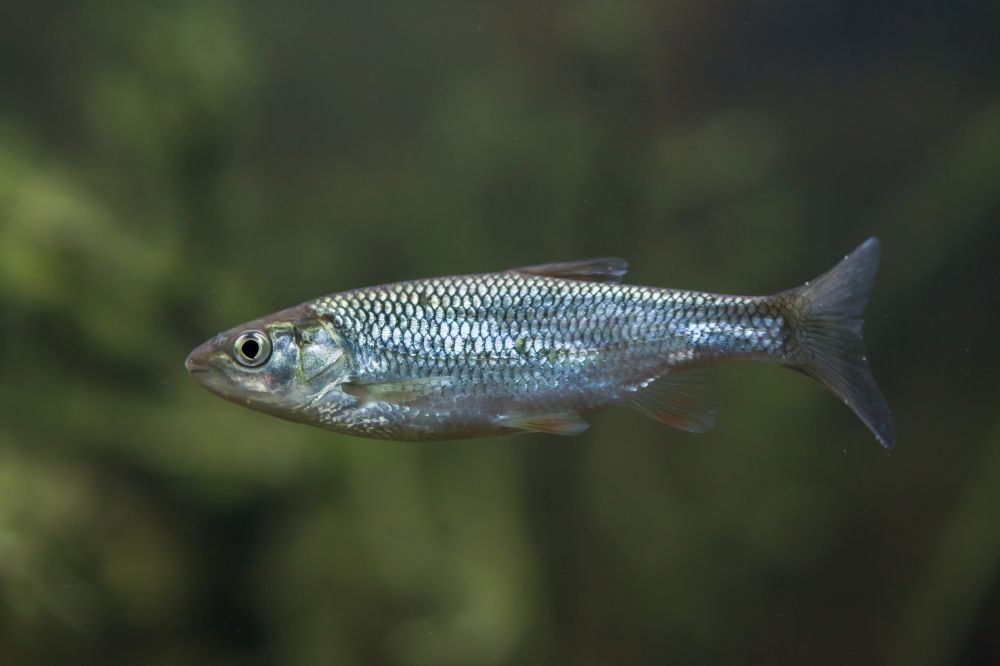
The Bleak fish is a Cyprinidae. In general, its average size is 10 to 15 cm and its weight is 15 to 50 g. However, some individuals can reach up to 60 g for a size of 25 cm. The bleak has a lifespan of 6-7 years. The spawning period is between April and August. It can lay up to 7000 spawns. You can fish bleak from June to September. This fish swims quite fast and offers a little resistance during the catch. The bleak is a fish with an elongated body that is very compressed laterally, allowing it to have a high velocity. The upper jaw is shorter than the lower jaw. The mouth of the bleak is oriented upwards (above), a typical character of fish that seek their food on the surface. The caudal fin is strongly indented and the caudal peduncle is thin. The dorsal fin is inserted behind the pelvic fins and has a shorter base than the dorsal fin. Its name refers to the bright white color of its scales, which gives the bleak a metallic sheen. Its back is darker greenish-blue, its sides are silvery white and its fins are pale grey. During the breeding season, nuptial tubers appear on the backs and sides of males and their fins become orange.
Bleak Fish is a famous fish you can catch in Whilton.The Silver Bream
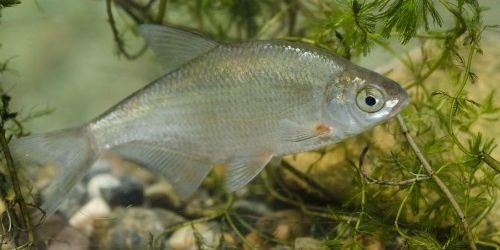
The Silver bream belongs to the Cyprinidae family. The usual size of the Silver bream is 20 to 30 cm and weighs about 200 g. The largest specimens can reach 35 cm. The life span of the Silver bream is about 10 years and it breeds from May to July. The female lays 20,000 to 60,000 eggs. It can be fished all year round. The Silver bream (Blicca bjoerkna) has a high, laterally flattened body, with a bushy back, characteristic of breams and accentuating with age. The head of this bream is small in relation to the size of its body but its eye is quite large, compared to its common cousin. Its snout is short and its mouth is oblique downwards, a characteristic common to fish seeking food on the bottom. The mouth is protractile (it unfolds forward) and free of barbells, surrounded by thick lips. The Silver bream is characterized by a long anal fin with between 22 and 26 rays, although shorter than the fresh water bream (26 to 30 rays). The dorsal fin of the Silver bream is short and high. The caudal fin is strongly indented. The Silver bream has a silvery coloring on the sides and belly, with a dark greyish-green or olive-colored back. The pelvic, pectoral and anal fins have an orange-red color. This last coloring can affect the whole stomach in older Silver breams.
The Silver Bream is a famous fish you can catch in Whilton.The Ide fish
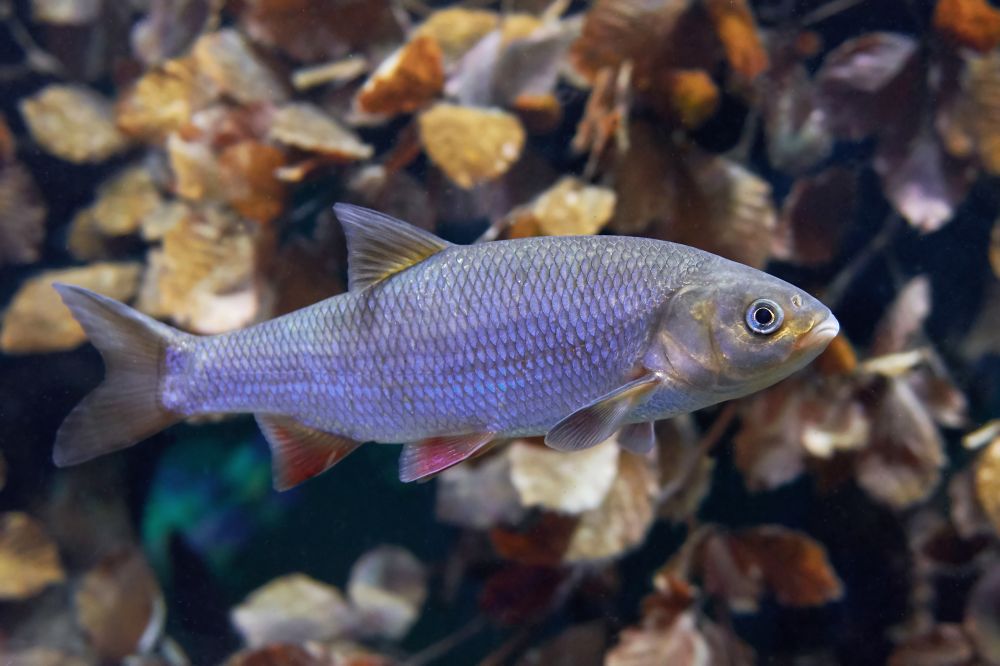
The Ide fish belongs to the Cyprinidae family. Its size is generally between 30 and 50 cm but this fish can reach a maximum length of 80 cm for a weight of 5 kg and an age of nearly 20 years. Spawning takes place from March to April. Females lay between 60,000 and 160,000 eggs. The fishery is open from June to March. The body is long and laterally compressed with a terminal mouth pointing upwards. The head is strong with a small mouth, obtuse snout and yellow eyes. The back is rounded. The anal fin has a concave rear edge. The back and upper part of the head are greyish-green to brown; the yellowish-brown flanks have silvery or golden reflections; the belly is whitish. The fins are dark except for the pelvic, ventral and anal fins which are frankly red. In older and larger specimens, the body color may turn yellow/bronze.
The Ide fish is a famous fish you can catch in Whilton.The Chub fish
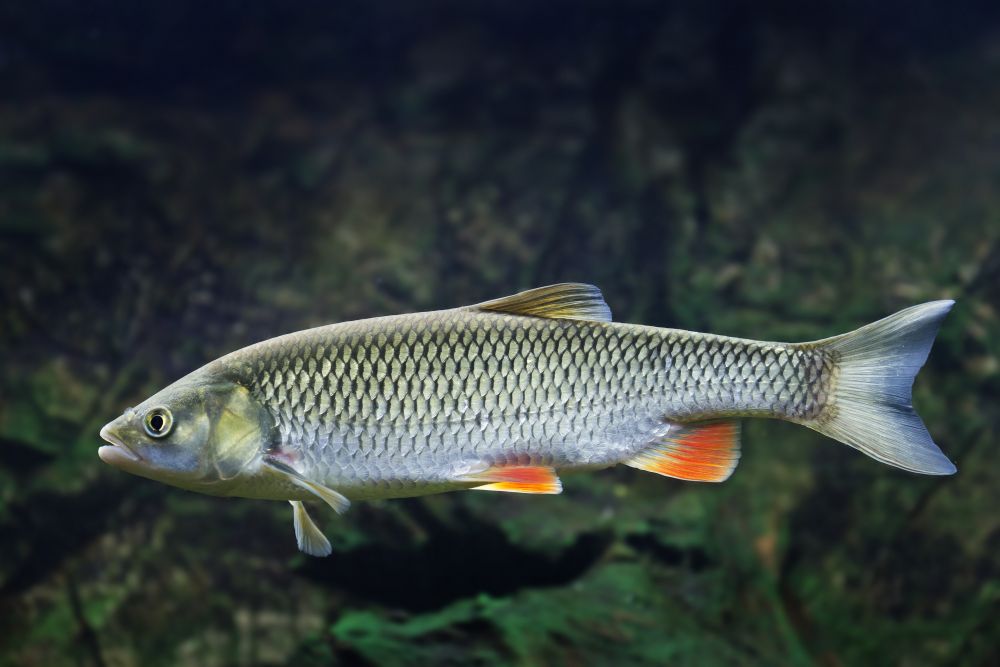
The chub fish belongs to the family of Cyprinidae. The common catch size of the chub fish varies from 15 to 30 cm, but it can reach 80 cm for a weight of 8 kg. The longevity is estimated at about ten years. The reproduction of the chub takes place between April and June. The female lays 20,000 to 100,000 eggs. It can be fished from July to Mars. The body is long and cylindrical with a terminal mouth, pointing upwards, with large lips. The big head has a flat forehead. The large, black-edged scales give it a reticulated appearance. The anal fin has a convex rear edge. The back and upper part of the head are greyish-green to brown in color; the flanks have silvery or even golden highlights; the belly is whitish. The fins are grey except for the bellies and the pale red anal fin.
The Chub fish is a famous fish you can catch in Whilton.The Salmon fish
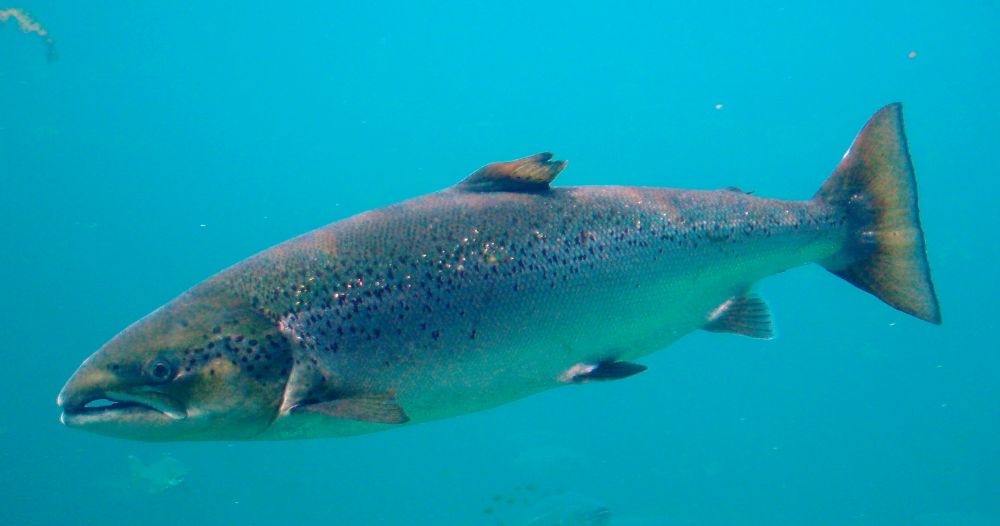
The Salmon fish belongs to the Salmonidae family. It can reach a maximum weight of 47 kg for a height of 1.5 m. The current size of the salmon is 50 to 70 cm, with a weight of 2.3 to 9.1 kg. It can reach a maximum weight of 47 kg for a height of 1.5 m. The current size of the salmon is 50 to 70 cm, with a weight of 2.3 to 9.1 kg. Spawning season is in October-November. Fertility is 1,500 and 1,800 eggs per kg of weight. It is fished in March in October. Salmon have a hydrodynamic and powerful body. The caudal peduncle is elongated and narrower than in trout, with which salmon share many characteristics. The mouth does not extend beyond the plumbing of the posterior edge of the eye. Adults have sexual dimorphism in the muzzle. Females have a rounded snout, while males have an elongated snout and their jaws bend sharply as they age, giving them the name of becard. The caudal fin is fairly indented, with a concave posterior edge and well defined tips. The adipose fin characteristic of Salmonids is present in salmon. The livery is different depending on the reproductive stage of the individual. The parr have 8 to 11 dark-colored vertical bars on the sides. The smolt and the adult have a silvery livery with black cross-shaped punctuation above the lateral line. At the time of reproduction, the male is adorned with bright colors.
The Salmon fish is a famous fish you can catch in Whilton.Our fishing forecast of Whilton indicates the best time to go fishing in this city.
Our fishing forecast of Whilton indicates the best time to go fishing in this city.
Our fishing forecast of Whilton indicates the best time to go fishing in this city.
